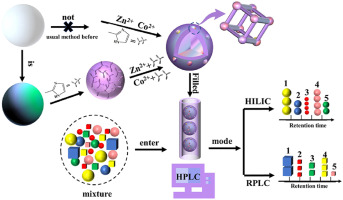Abstract
The preparation of the metal-organic frameworks (MOFs)@silica core-shell microspheres as the stationary phases mainly relied on the method of electrostatic interaction between the metal ions of MOFs and the silanol groups. Herein, the ligands of MOFs were preferentially modified to the surface of silica as connection points and seed crystals to connect or form the MOFs. In this way, the evenness of the MOFs particles on the silica surface was effectively improved, and the prepared composites possessed excellent reproducibility and stability, including acid-base stability. The relative standard deviation of the retention time for repeatability ranged from 0.1% to 0.26% and for stability retention time from 0.3% to 0.6%. Compared with commercial columns, the prepared stationary phase showed enhanced separation selectivity for separation of both hydrophilic and hydrophobic compounds containing alkaloids, nucleosides, antibiotics and alkylbenzenes, etc. The obtained column was used as a matrix for fast separation and analysis of antibiotics in actual samples. In short, the composites showed superior reproducibility, stability and satisfactory separation performance towards a variety of compounds in the studied conditions. It also provided another way to improve the evenness of MOFs particles on the surface of silica and enhance the stability of them under polar conditions. (c) 2021 Elsevier B.V. All rights reserved.

Keywords Plus:METAL-ORGANIC FRAMEWORKPERFORMANCE LIQUID-CHROMATOGRAPHYWATER
Published in ANALYTICA CHIMICA ACTA,Volume 1183;10.1016/j.aca.2021.338942,OCT 23 2021


